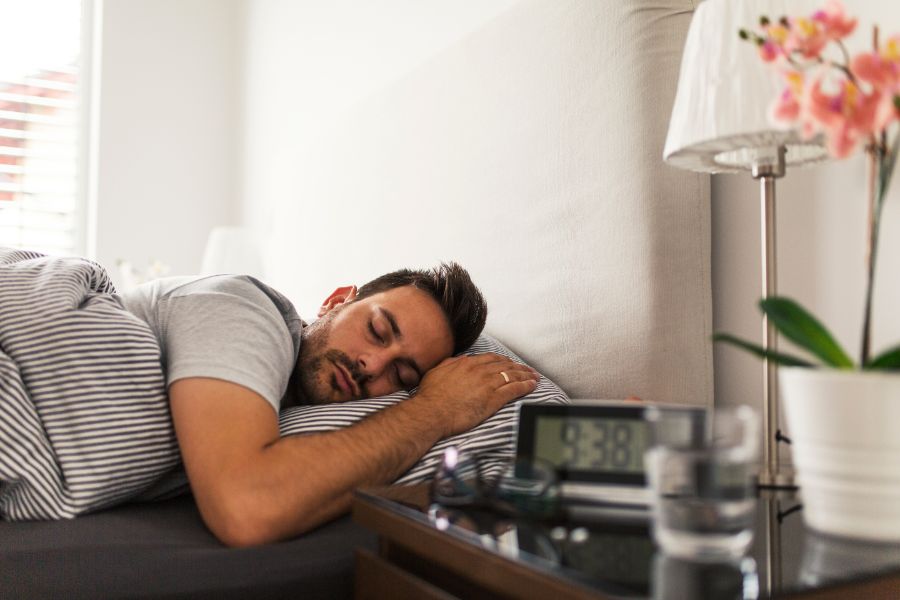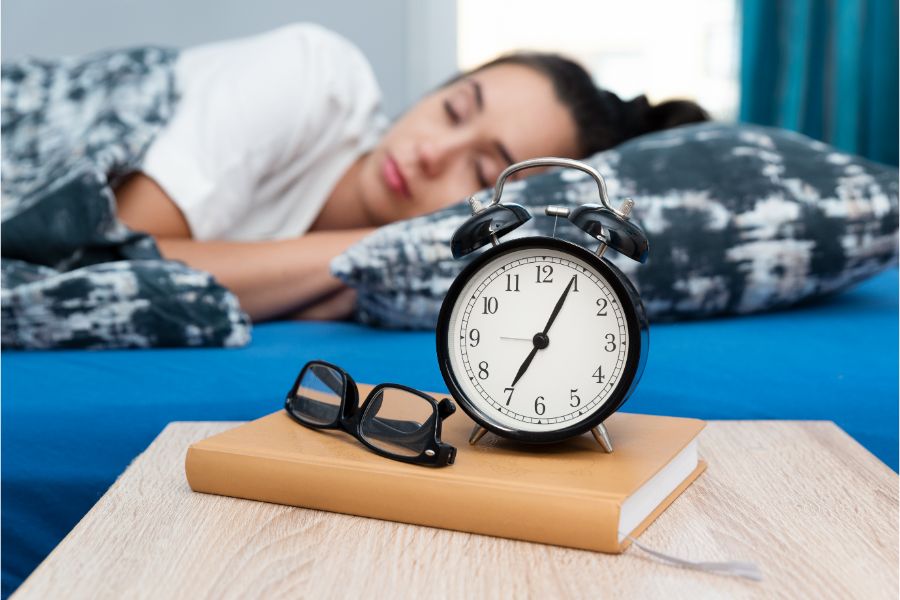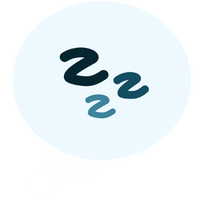How many hours of sleep do you think you need? Chances are, you’re thinking about eight hours, right?
For years, scientists and health professionals have told us that adults require seven to eight hours of sleep a day. However, the widely accepted rule of sleeping for 8 hours might not be exactly true.
As it turns out, people are different. While some people require eight hours of sleep, others may need more hours to function well.

So, how come eight is the magical number?
Well, this article answers this question and more. So, stick around and discover if you need eight hours of sleep or more to maintain the normal function of your body and mind.
8 Hours Sleep Myth
Sometimes, it’s difficult to differentiate between facts and myths. Do we need to drink eight glasses of water a day? Are eight hours of sleep necessary?
We have heard these statements for a long time, and we now believe in them. But how did eight hours become the gold standard for sleep duration?
According to psychologist Haily Meaklim, the concept of 8-hour sleep time started with the industrial revolution and the advent of artificial lighting.
Before these, people used to sleep in segments. They had two hours of sleeping blocks (periods) separated by a session of wakefulness (it lasted an hour or two). During this time, some individuals woke up to do various chores or visit neighbors. Others remained in bed, praying or talking to their partners.
However, the invention of light bulbs meant that people could work for longer hours. Because of this, the time dedicated to rest reduced. And as massive changes to industrialization and obsession with capitalism and productivity continued, sleep patterns changed.
Medical journals began recommending that middle-of-the-night wakefulness was a waste of time and infective. They advocated for a new idea of a consolidated 8 hours of sleep, labor, and recreation.
Over time, the idea of two sleep periods receded from their social consciousness. And now, clinical psychologists refer to this sleep pattern as insomnia.
Is 8 Hours of Sleep Enough?
Did you know you sleep around one-third of your life?
But in today’s hustle-centered world, getting a good night’s sleep is difficult. The daytime naps, increased caffeine intake, stress, technology, and work demands disrupt our internal circadian clock. As a result, they alter our sleep patterns and reduce our performance and productivity.
Besides, sleep deficiency impairs several psychological and physical functions, like learning, immunity, and memory. Also, it increases an individual’s susceptibility to chronic health conditions, including:
- Diabetes
- Stroke
- Kidney diseases
- High blood pressure
- Heart disease
But how much sleep do you need to maintain good health and improve your productivity?
Well, there’s no one-size-fits-all answer. Studies have repeatedly demonstrated age, lifestyle, genetics, and other factors contribute to people’s diverse sleep needs.
Research from 2016 suggests people need an average of 8 hours and 40 minutes (give or take 10 minutes) of sleep to function at their best. But another research suggests that some people thrive on 9 hours of sleep or more.
However, these are just sleep duration recommendations issued by public health organizations like National Sleep Foundation (NSF). These guidelines inform people of intervention policies and promote healthy sleep behaviors.
Most recommendations are similar and based on the available evidence and expert consensus. Nevertheless, they highly depend on observation studies using individually reported sleep duration.
Considering how difficult it is to measure the amount of sleep you get at night by yourself, these recommendations might not be entirely correct. What’s more, they only focus on how much sleep individuals get, not how much they require.
While these guidelines might be an excellent tool for public health surveillance, they suggest a generalized sleep duration for the entire population. They don’t factor in inter-individual variability in terms of sleep needs.
So, there’s no ideal sleep duration that applies to everyone.
Sleep Time Recommendations by Age
Perhaps one of the primary factors that affect sleep needs is age. Each age group has a recommended range of night sleep duration for better health and improved performance. The table below highlights the recommended sleep time for each age group by NSF.
| Age Group | Age Range | Recommended Time of Sleep | Not Recommended |
| Newborns | 0–3 months | 14–17 hours | Less than 11 hours
More than 19 hours |
| Infants | 4 -11 months | 12–15 hours | Less than 10 hours
More than 18 hours |
| Toddlers | 1-2 years | 11- 14 hours | Less than 9 hours
More than 6 hours |
| Preschoolers | 3–5 years | 10–13 hours | Less than 8 hours
More than 14 hours |
| School-Age Kids | 6–13 years | 9–10 hours | Less than 7 hours
More than 12 hours |
| Teenagers | 14–17 years | 8 – 10 hours | Less than 7 hours
More than 11hours |
| Young Adults | 18 -25 years | 7 – 9 hours | Less than 6 hours
More than 11 hours |
| Adults | 26–64 years | 7 – 9 hours | Less than 6 hours
More than 10 hours |
| Older Adults | 64 years and above | 7 – 9 hours | Less than 5 hours
More than 9 hours |
As you can see from the table, newborns, infants, toddlers, and preschoolers require more hours of sleep.
The additional sleep time allows their brains to grow, creating networks that promote thinking and learning. Combined with proper nutrition, long naps help kids develop physically, grow and improve thrive motor skills.
As for preteens and adult teenagers, they require 8 to 9 hours of sleep to function at their best. At this age, sleep is paramount because it helps teens undergo physical, mental, and emotional development.
If teens don’t receive enough night’s sleep, their attention, memory, and mood will suffer. On top of that, physical development that happens during adolescence might get impacted. For instance, they might have a troubling metabolic profile and become prone to high blood pressure and cholesterol levels.
As we age, our bodies produce limited growth hormones. As a result, adults are most likely to experience a decrease in sleep needs. Old age also affects the production of melatonin and cortisol, which play a crucial role in promoting sleep.
A 2022 study suggests that adults (38 to 73 years) require approximately seven hours of sleep to maintain cognitive performance and better mental health. The research continues to say that insufficient or excess sleep can harm cognitive performance and worsen mental health.
Also Read: Do Women Need More Sleep Than Men?
Why Do I Wake Up Tired After Sleeping for 8 Hours?

Waking up feeling tired even after clocking 8 hours of sleep can be a bummer. However, this discrepancy is not uncommon and occurs due to several reasons, including:
1. Sleep Inertia
Sleep inertia is that feeling of grogginess you get upon waking up. From a scientific angle, it’s a circadian process that controls our mood, memory, alertness, and reaction time when we first wake up. It is associated with disorientation, decline in mood, impaired performance, and slower reaction time.
Studies show that sleep inertia lasts for 15 to 60 minutes. But sometimes, the feeling can linger on for up to 2 hours. When this happens, it can affect the quality of your life. The reason is, sleep inertia influences highly developed cognitive skills, including:
- Decision making
- Creativity
- Evaluative thinking
- Rule Usage
- Remembering and learning
Things become worse, especially if you are sleep deprived.
The most effective way to address the feeling of tiredness is to take a cup of coffee and get enough natural light. Exercising can also help shake off this feeling.
However, if the feeling persists, Dr. Raj Dasgupta, a clinical associate professor of medicine, suggests visiting a specialist. Maybe the sleep inertia is caused by an underlying sleep problem.
2. Sleep Debt
Sleep debt is the amount of sleep you owe your body. We can also define it as the difference between the amount of sleep you need and what you get.
For instance, if your body needs to rest for 8 hours every but you only sleep for 6 hours. You have a sleep deficiency or debt of 2 hours.
Keep in mind, sleep debt is cumulative, meaning it can accumulate over time. Because of this, you might wake up with increased levels of fatigue and tiredness.
And if that’s not enough!
A prolonged state of sleep debt could increase your risk of chronic conditions, like diabetes, stroke, and heart disease. The sleep deficit might cause weight gain, decreased immunity, and increased risk of falls and accidents.
The only way to avoid these issues is to pay the sleep debt. But how?
Below are a few ways to pay and reduce the chances of accumulating sleep debt:
- Having a sleep schedule–Make sure you go to bed and wake up at the same time. But we recommend going to bed a bit earlier.
- Create a nighttime routine–A night routine allows your body to relax and prepare itself for sleep. The routine could involve switching off electronics, dimming lights, and finding a better way to relax 30 minutes before bed.
- Consider daytime habits–To avoid sleep debt, stay away from coffee before going to bed. You should also consider restricting the bed to sleeping and coitus.
3. Higher Sleep Need
By now it’s clear sleep needs vary between individuals. So, if you sleep for 8 hours but still feel tired, it means your body still needs more hours of sleep. This additional time allows your body to rest, clear out metabolic waste, and repair damaged cells and tissues.
If you don’t meet your sleep need, you’ll not only wake up groggy but you might also feel sleepy during the day. Overall, lack of sufficient sleep affects everything, from cognitive performance to well-being.
Sleep deprivation also increases the chances of developing health problems and getting into accidents. For this reason, it’s crucial to pay attention to the amount of sleep your body needs and what you receive each night.
Additional Factors That Might Increase Your Sleep Need
- Health conditions: Some disorders like sleep apnea, restless legs syndrome, and bruxism, can affect your quality of sleep. As a result, your body might require more sleep hours to deal with these conditions and prepare for the new day. Other diseases that could increase the amount of sleep you need include Narcolepsy and Delayed Sleep Phase Syndrome.
- Exercises: After intense exercises like weight lifting and running, your body will feel more tired than usual. It will require more than your usual eight hours of sleep to heal and recover from muscle damage and fatigue.
- Mental Health Condition: Mental health problems could also interfere with your sleep need one way or another. For instance, depression might lead to nighttime wake-ups and cause insomnia. But sometimes it can cause a desire to sleep for long hours, says the chief research officer at Sleepopolis, Rose MacDowell. Additionally, individuals with bipolar might have a higher sleep need during their depressive phase.
4. Out of Sync Circadian Rhythm
The circadian rhythm refers to your body’s 24-hour internal clock. It controls your body’s sleep-wake cycle, temperature, hormones, and mood.
If your circadian rhythm is out of sync or misaligned, you will wake up with low energy levels and feel tired throughout the day. This holds even if you get 8 hours of sleep.
You might experience circadian rhythm misalignment if you regularly work night shifts or sleep at irregular times.
Besides low energy levels, misaligned circadian might cause difficulty in falling asleep and waking up, as well as insomnia. Fortunately, you can sync up your circadian rhythm by doing the following:
- Create and follow a sleep schedule/ routine that works for you, even on weekends or off days.
- Go to bed at the right time.
- Get sufficient natural light during the day, but avoid bright light 1 hour before going to sleep.
Also Read: Why Am I Tired but Can’t Sleep
Shift Your Focus from Sleep Time to Sleep Quality
Like sleep duration (sleep need), your sleep quality is crucial for overall health and well-being.
A quality night’s sleep means you spend enough time in each sleep stage: NREM (non-rapid eye movement) and REM (rapid eye movement) sleep. This promotes proper memory consolidation, cellular repair, and hormone regulation.
Studies show that people who prioritize their quality of sleep enjoy several benefits. These include boosted immunity, enhanced cognitive function, and better mood regulation.
So, focus on improving your sleep quality, and you will meet your body’s sleep needs.
Read More: Is 6 Hours of Sleep Enough?
FAQs
Is 8 Hours of Sleep Good?
Yes! 8 hours of sleep is enough to reset your body and mind after a busy day. It allows the body to repair damaged cells and tissues, boost the immune system, and enhance memory consolidation. What’s more, if you get 8 hours of sleep, you can avoid grumpy mornings.
Do You Really Need 8 Hours of Sleep?
8 hours of sleep might seem like a magical number, but it’s not set in stone for everyone. While some people might thrive with eight hours of sleep, others may require a bit more shut-eye to function. Also, remember your lifestyle, genetics, and age could dictate your sleep needs.
What Are the Benefits of 8 Hours of Sleep?
If your body’s sleep need is 8 hours, you will enjoy the following benefits:
- Improved mood and emotional well-being
- Increased energy levels and productivity
- Enhanced memory and cognitive performance
- Strengthened cardiovascular system
- Healthy immune system
- Reduced risk of chronic health conditions, like diabetes
